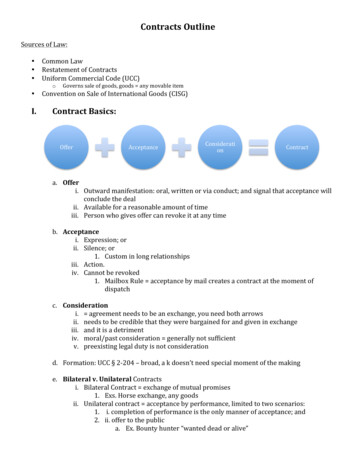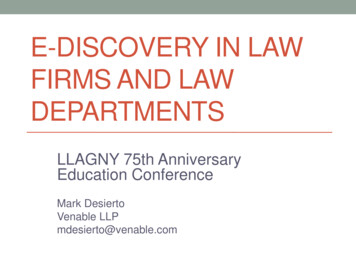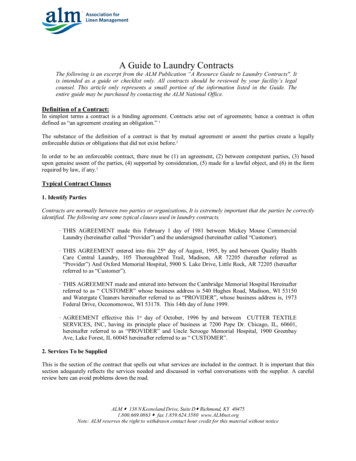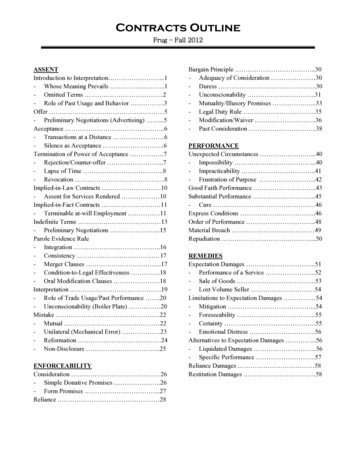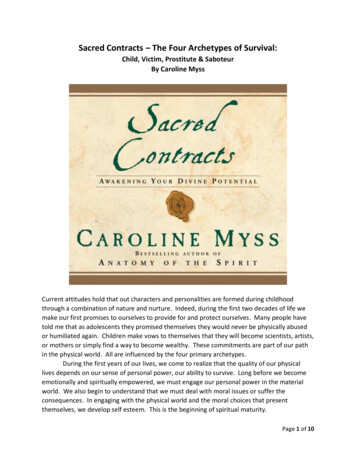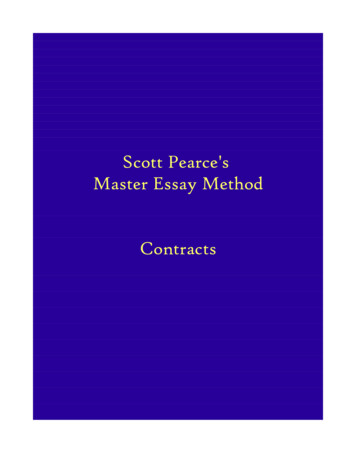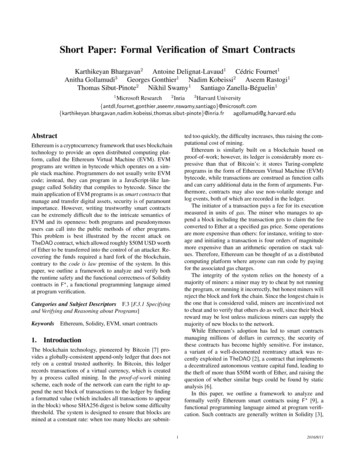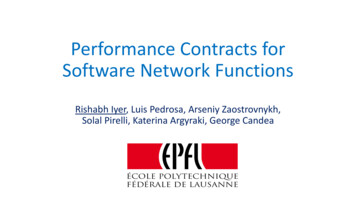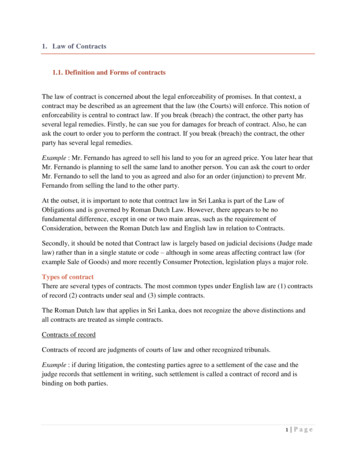
Transcription
1. Law of Contracts1.1. Definition and Forms of contractsThe law of contract is concerned about the legal enforceability of promises. In that context, acontract may be described as an agreement that the law (the Courts) will enforce. This notion ofenforceability is central to contract law. If you break (breach) the contract, the other party hasseveral legal remedies. Firstly, he can sue you for damages for breach of contract. Also, he canask the court to order you to perform the contract. If you break (breach) the contract, the otherparty has several legal remedies.Example : Mr. Fernando has agreed to sell his land to you for an agreed price. You later hear thatMr. Fernando is planning to sell the same land to another person. You can ask the court to orderMr. Fernando to sell the land to you as agreed and also for an order (injunction) to prevent Mr.Fernando from selling the land to the other party.At the outset, it is important to note that contract law in Sri Lanka is part of the Law ofObligations and is governed by Roman Dutch Law. However, there appears to be nofundamental difference, except in one or two main areas, such as the requirement ofConsideration, between the Roman Dutch law and English law in relation to Contracts.Secondly, it should be noted that Contract law is largely based on judicial decisions (Judge madelaw) rather than in a single statute or code – although in some areas affecting contract law (forexample Sale of Goods) and more recently Consumer Protection, legislation plays a major role.Types of contractThere are several types of contracts. The most common types under English law are (1) contractsof record (2) contracts under seal and (3) simple contracts.The Roman Dutch law that applies in Sri Lanka, does not recognize the above distinctions andall contracts are treated as simple contracts.Contracts of recordContracts of record are judgments of courts of law and other recognized tribunals.Example : if during litigation, the contesting parties agree to a settlement of the case and thejudge records that settlement in writing, such settlement is called a contract of record and isbinding on both parties.1 Page
Contract under SealA contract under seal is also called a deed or a specialty contract. This is a contract which is inwriting and signed by both arties and is formally executed by the affixing of a seal.Example : Conveyances relating to property – If you buy or sell a land, a notary must notariallyexecute the contract with two witnesses. In Sri Lanka a seal is not used like in England.Simple ContractsSimple contracts are the most common type of contract. Most business contracts are simplecontracts. A simple contract may be in writing or be made verbally or by conduct. No formalitiesare required for simple contracts except where required by legislation. The legal rules relating tocontracts discussed below apply to simple contracts.Definition and requirements of a contractA contract is an agreement between two or more parties which will be enforced by law. As statedearlier, the general law governing the contracts in Sri Lanka is the Roman Dutch law which is thecountry’s common law. Apart from Roman Dutch law, certain areas of contracts are governed bystatute law and also by English law.Requirements for there to be a contract1. There must be an agreement between two or more persons.2. The parties must intend that their agreement will result in legal relations3. The contract must comply with any required statutory formalities.4. In English law, there is a requirement that the agreement must be supported by what iscalled ‘consideration’. However, the Roman-Dutch law which applies in Sri Lanka doesnot require ‘consideration’. In Roman Dutch law any good or valid reason which isexpresses by the Latin term justa causa will suffice for a contract.5. The parties to the agreement must have ‘legal capacity’ to contract. For example, acontract with a person who is mentally unsound is not valid.6. The agreement must be genuine and not be affected by factors such as mistake,misrepresentation, fraud, undue influence and duress.7. The agreement must be for a purpose of object which is not illegal or contrary to publicpolicy.Intention to create legal relationsAn agreement alone will not create a contract binding in law. A critical factor in the formation ofa contract is the necessity for an intention by the parties to create legally binding obligations.Unless the intention of the parties is to constitute an agreement enforceable at law, there will beno contract.2 Page
Domestic/social agreements generally not contractsThis rule excludes agreements of a purely social and domestic nature from coming within thecategory of legal contracts.Example : If Mr. Perera agrees to lend his bicycle to his friend Mr. Silva and alter refuses or failsto do so, Mr. Silva will not be able to sue Mr. Perera for a breach of contract. This is because Mr.Perera’s promise was of a social nature – a promise by a friend to another friend. Neither Mr.Perera or Mr. Silva would have contemplated legal action when he promised to lend the bicycle.Example : If a father fails to pay his son the promised pocket money or a husband does nothonour his promise to buy his wife a birthday present, it is clear that neither the son or the wifecan sue the father of the husband. This is because both promises were of a domestic nature whichcourts of law will not enforce if broken.There are several well-known judicial decisions which have confirmed the above view.In Balfour v Balfour [1919] 2 KB 571 a husband who was a British civil servant workingin Sri Lanka promised, his wife who had stayed back in England, a household allowanceof 30 per month. Subsequently, the couple decided to separate and the wife sued thehusband for the allowance which he had stopped paying. The English Court of Appealheld that the husband was not liable to pay it because the agreement between the husbandand his wife was of a domestic nature and was not a contract enforceable in law.‘Agreements’ between business people are presumed to be ‘contracts’When business people or commercial institutions enter into agreements, there is a presumptionthat such agreements result in legally enforceable contracts.Example : Mr. Silva and Mr.Perera are two businessmen. They are also good friends. Mr. Silvagrees to sell a property to Mr. Perera for an agreed price and executes a notarial document tothat effect. Mr. Silva tells Mr. Perera, “although I agreed to sell that property to you, I have nowchanged my mind and I have decided to sell it to another party”. Despite their close friendship,Mr. Perera can take legal action against Mr. Silva to enforce the written agreement since it was acommercial transaction.In Brussels Lambert SA v Australian National Industries Ltd [1989] 21 NSWLR 502, acompany gave what is called a ‘letter of comfort’ to a bank which the bank has askedbefore it gave a loan to a subsidiary firm owned by the company. ‘A letter of comfort’is a written statement where a parent company states that its subsidiary is financiallysolvent and that the parent company feels that any loan given to the subsidiary will berepaid. The company later argued that its ‘letter of comfort’ did not create anycontractual obligations upon it to pay the bank if the subsidiary failed to repay theloan. The Australian court held that these agreements between commercial institutionswere contracts and therefore enforceable by courts.3 Page
Agreement between two or more personsThe basis of a contract is an agreement between two or more persons. The minds of both partiesmust agree about the subject matter of the contract.The legal term used for a complete and genuine agreement between the parties is consensus adidem (meeting of two minds). The courts have adopted the process of ‘offer and acceptance’ tosee whether there has been agreement.Example : If Mr. Silva wishes to buy a car from Mr. Perera, they must agree about the price andother terms of delivery etc. Mr. Silva the buyer will be the offeror and Mr. Perera will be theofferee. Mr. Silva’s offer to Mr. Perera is “I will buy your car for Rs. 850,000/-.” Mr. Perera theseller has to accept this offer, for there to be a contract.1.2. Offer & Acceptance, Capacity to contract, Consideration for the contract1.2.1. Offer and AcceptanceStatements preliminary to an offerOften people who wish to enter into contracts make statements preliminary to the offer. Thesepreliminary statements must be distinguished from the offer.There are two main types of such preliminary statements that are not offers. These are;1. An invitation to make an offer; and2. A declaration of intention.Invitation to make an offerAn advertisement or an invitation to make an offer is not an offer which is capable of beingturned into a contract by acceptance.Example : A shopkeeper who displays goods in his shop window with a price tag on them statinga price, does not make an offer, but merely invites the public to make an offer to buy the goods atthe price stated.The following well know case law illustrate this position.In Fisher v Bell [1961] 1 QB 394, certain legislation prohibited the sale or any‘offer to sell’ certain types of knives with long blades. A shopkeeper had displayedsuch knife for sale in his shop window. He was prosecuted by the police under thelegislation for “having offer the knife for sale”. The court dismissed the charge onthe ground that the display of the knife in the shop window was not an ‘offer’ to sellthe knife but only an advertisement or an invitation to the public to inspect theknife. This was a highly technical argument but the court upheld it.4 Page
However, it is conceded that consumer protection law under our Consumer Affairs Authority Actof 2003 may cast obligations on traders, businessmen, and shopkeepers etc. which will overridethe above contract law rules.Declaration of intentionA declaration by a person that he intends to do a thing gives no right of action to another whosuffers loss because he does not carry put his intention. Such a declaration only means that anoffer is to be made or invited in the future, and not that an offer is made now.Example : if an auctioneer announces the holding of an auction it is not an offer but only anadvertisement that an auction will take place. Thus, if the auction is cancelled or postponed at thelast moment, any members of the public who came for the auction cannot claim their travelexpenses from the auctioneer. Harris v Nickerson [1873] 1 LR 8 QB 286.How an offer is madeThe offer may be express, or implied from conduct. The person makinf the offer is called theofferor, and the person to whom the offer is made is called the offeree.An offer may be made to (i) a definite person (ii) to the world at large, which means to thegeneral public or (iii) to some definite class of persons. An offer to a definite person can only beaccepted by that person and by no one else. An offer to the world at large can be accepted byanyone. An offer to some definite class can only be accepted by a member of that class.All offers must be communicatedAll offers must be communicated to the offeree before they can be accepted. The offeree cannotaccept an offer unless he knows of its existence, because he cannot accept it without intending todo so, and he cannot intend to accept an offer of which he is not aware.Example : If A offers by advertisement a reward for Rs. 5,000/- to anyone who returns his lostdog, and B, finding the dog, brings it to A without having heard of the offer of the reward, B isnot entitled to the reward of Rs. 5,000/-.This legal position has been explained by the courts in several decided cases;In the American case of Fitch v Snedaker (1868) 38 NY 248, a reward had beenoffered by the Police for information leading to the arrest and conviction of amurderer. The Plaintiff, who was not aware of the offer of a reward, gave informationto the police as a result of which the murderer was arrested. The Plaintiff was theninformed of the reward and he claimed it. The Court held that he was not entitled tothe reward because he had not been aware of a reward (the offer)) when he gave theinformation (acceptance of the offer).5 Page
Lapse of an offerAn offer lapses1. On the death either of the offeror or the offeree before acceptance. Death after acceptancehas no effect in the majority of contracts and the executor of the deceased person will beresponsible to perform the obligations of the contract unless they are of a personal nature.Example : A agrred to paint B’s portrait. A dies before he does so. The contract cannot beperformed because it involves A’s personal skill as a portrait artist.2. By non-accepatance within the time prescribed for acceptance by the offeror.Example : Mr. Silva tells Mr. Perera, “I offer to sell my car for Rs. 2 milion if you buy itwithin two weeks.” If Mr. Perera does not pay the money within two weeks, Mr. Silva’soffer lapses.3. When no time for acceptance is prescribed, by non-acceptance within a reasonable time.What is reasonable time depends on the nature of the contract and the circumstances ofeach case.Revocation of offerAn offer may be revoked in accordance with the following rules;1. An offer may be revoked at any time before an acceptance. An offer is irrevocable afteracceptance.2. Revocation of an offer does not effect until it is actually communicated to the offeree.Communication for this purpose means that the revocation must have actually come tothe knowledge of the offeree.In the case of Byrne v Van Tienhoven [1880] 5CPD 344, A by a letter dated October 1offered to sell the goods to B in New York. B received the offer on the 11th of Octoberand immediately telegraphed his acceptance. On the 8th of October, A wrote revoking hisoffer, and this was received by B on the 25th of October. Held, the revocation was of noeffect until it reached B, and a contract was made when B telegraphed his acceptance ofthe offer to A. The telegraph (acceptance) has been sent before B was notified of therevocations.The communication of the revocation need not have been made by the offeror. It is enough thatthe offeree learns of the revocation from a source which he believes to be reliable.In the case of Dickinson v Dodds X agreed to sell property to Y by a document which states“this offer to be left open until Friday, 9 a.m.”. On Thursday, X contracted to sell the propertyto Z. Y heard of this from B, and on Friday at 7 a.m. he delivered to X an acceptance of his6 Pageoffer. Held, Y could not accept X’s offer because before he “accepted” he knew it had beenrevoked by the sale of the property to Z.
Rejection of offerAn offer is rejected;1. If the offeree communicates his rejection to the offeror.2. If the offeree makes a counter offer.In the case of Hyde v Wrench [1840] 3 Beav 334. A offer to sell a farm to B for 1,000/-. Boffered 950/-. A refused and B then said he would give 1,000/-. Held no contract, as B’soffer of 950/- was a counter offer rejecting the original offer which was at a price of 1,000/-.3. If the offeree accepts subject to conditions.Jordan v Norton [1838] 4M & W 155. N offered to buy J’s horse if J guaranteed that thehorse was not vicious. J agreed to the price but said nothing about the condition of thehorse. The court held that N’s offer had been rejected because J had not guaranteed thegood condition of the horse.The AcceptanceAcceptance is only possible if the offer is still in force.The accepatance must be made while the offer is still in force, and before the offer has lapsed,been revoked or rejected. Once the acceptance is complete, the offer cannot be revoked. Itbecomes irrevocable.Acceptance must be absolute and unqualifiedOnly an absolute and unqualified assent to all the terms of the offer constitutes an effective andvalid acceptance. If the offer requires the offereee to promise to do or pay something, theacceptance must conform exactly to the terms of the offer. If the offer requires an act to be done,the precise act and nothing else must be done. If the “acceptance” varies the terms of the offer itis a counter offer, and not an acceptance of the original offer.In the case of Neale v Merrett [1930] WN 189 M offer land to N at 280. N repliedaccepting, and enclosing 80 with a promise to pay the balance by monthly installments of 50 each. Held, no contract, as there was not an unqualified acceptance.A mental acceptance which is not properly communicated to the offeror is not sufficient.As a general rule, a mental acceptance or an uncommunicated agreement to an offer does notresult in a contract, and the acceptance must be communicated in writing, or by words orconduct. What constitutes communication of an acceptance will depend on the facts of each case.7 Page
Remaining silent is not acceptanceGenerally speaking, silence or inaction by the offeree will not amount to an acceptance.The above legal position was established in the English case of Felthouse v Brindley[1862] 11 CB 869. In that case Felthouse, wrote a letter to his nephew to buy hisnephew’s horse for USD 30, saying, “If I hear no more about this offer, I shall considerthat the horse is mine at USD 30.” The nephew did not reply, but he told the auctioneer(Brindley) who was selling the horse not to sell that particular horse because it was sold tohis uncle. By mistake, the auctioneer sold the horse. Felthouse then sued the auctioneerarguing that the horse belonged to him. The court held that Felthouse was not the ownerof the horse because the horse had not been sold to him. His offer of USD 30 for the horsehad not been properly accepted by his nephew.Manner of acceptance can be prescribedIf the offeror prescribed or indicated a particular method of acceptance and the acceptor acceptsin that way, there will be a contract, even though the offeror does not know of the acceptance.Example : the offeror requires the offeree to accept by advertisement in a particular column of acertain newspaper, the acceptance will be communicated when the advertisement is published asrequested, whether or not the offeror reads it or sees it.Failure to accept in the prescribed method may mean that there is no valid contract.In Eliason v Henshaw (1819) 4 Wheaton 225, Eliason sent a letter to Henshawby a wagon offering to buy flour. He requested a reply by the same wagon.Henshaw agreed to supply the flour but sent his reply by post thinking the postwould be quicker than the wagon. However, Henshaw’s letter of acceptancearrived six days after the wagon and Eliason had purchased the flour fromanother party. Henshaw sued Eliason for breach of contract. The court held thatthere was no contract because the offeree (Henshaw) has not accepted in themanner prescribed by the offeror. (Eliason).Where the method of acceptance is not stipulatedWhere the offeror does not stipulate the method of acceptance, the offeree may accept in areasonable manner.Example : The offeror may accept in the same way in which the offer was made. If the offer wasmade by post, the reply can also be by post.8 Page
Acceptance by acting on the offerIf the offer is one which is to be accepted by being acted upon, no communication of acceptanceto the offeror is necessary, unless communication is stipulated for in the offer itself.Example : If an offer of a reward is made for finding a lost dog, the offer is accepted by findingthe dog, and it is unnecessary before beginning to search for the dog to give notice of acceptanceof the offer.In the case of Carlill v Carbolic Smoke Ball Co [1893] 1 QB 256, a pharmaceutical companyoffered 100 to anyone who contracted influenza after using their medicine. Mrs. C. Carlill usedthe medicine, but notwithstanding that, she got influenza. She claimed 100, but the companyargued that she should forst have notified them of her acceptance of their offer. It was held thatthe offer was properly accepted by using the medicine without any formal notice of acceptanceof the offer.Acceptance in instantaneous contractsThe following are the main types of instantaneous communications which concern the law ofcontract.1. Communications between persons present at the same place or very close to each other.Example : In a hall or large room. In such cases, if one person makes an offer anf the otherperson accepts the offer, the law requires certainty or confirmation that there was a validacceptance.2. Communication by telephoneExample : A who is in Colombo, telephone B in Kandy, offering to sell his car for Rs. 2million. B answering from Kandy says “yes, I accept your offer of Rs. 2 million for the car”.For there to be a valid contract A must also then confirm that he heard B’s reply acceptinghis offer.3. The above rules relating to confirmation of acceptance in the case of conracts betweenparties also applies to contracts entered into by (a) telex (b) fax and (c) email.In Entores Ltd v Miles Far East Corporation (1955) 2 QB 327, a company based in London(offeror) telexed an offer to a company based in Holland. (offeree). The company inHolland accepted the offer and telexed their acceptance from their office in Holland. TheDutch company argued that since acceptance was done on their fax machine in Holland, thecontract was concluded in Holland and the Dutch Court will have to decide any dispute. TheEnglish company argued that although the acceptance originated froma fax in Holland, theacceptance had to be confirmed by its receipt of the fax in London and until such time thecontract was not concluded. The Court agreed with the latter argument and held that anacceptance that is faxed is only concluded only when it is received by the other fax 9 P a g emachine. Therefore, it was the English Court that had jurisdiction to hear the dispute.
Acceptance in contracts by postPostal contracts are made by letter, telegram or cable. The telegram or cable are now rarely udesfor contractual negotiations and have been replaced by the telephone, fax or email.When contracts are made by letter, the acceptance is treated as complete from the date when it isposted.The rules applying to postal contracts may be stated as follows;An offer by post may be accepted by post, unless the offeror indicates another means ofacceptance. Even if the offer is not made by post the acceptance can be made by post if thecircumstances show that the parties must have contemplated that the post may be usedAn offer by post is only made when it actually reaches the offeree and not when it would havereached him in ordinary course of the post.In the case Adams v Linsdell [1818] 1B & Ald 681, A by letter dated September 2 offeredgoods to B saying “I expect to receive your answer in the course of the post.” The letterwas misdirected and did not reach B until the 5th, whn the offer was immediately accepted.The acceptance reached A on the 9th, but on the 8th A had sold the goods to X. Held therewas a good contract between A and B, because the offer was immediately accepted on itsreceipt by B. Therefore, A was liable to B for breach of contract.Acceptance complete on posting of letterAn acceptance by post is complete as soon as the letter of acceptance is posted, prepaid andproperly addressed, whether it reaches the offferor or not. If the letter is lost or delayed in thepost the contract is nevertheless made, although the offeror may be quite ignorant of that fact.If the acceptance, istead of being posted, is handed to a postman to post, the contract is notcomplete until the acceptance is actually received by the offeror.A revocation by post is not complete until it actually reaches the offereeIn the case of Henthorn v Fraser (1982) 2Ch 27, Fraser handed to Henthorn awritten option on some property at 750. The next day Fraser posted a withdrawalof the offer. This was posted between 12 and 1 and did not reach Henthorn untilafter 5 p.m. In the meantime Henthorn at 3.50p.m. has posted an acceptance. Thecourt held (1) although the offer was not made by post, yet the parties must havecontemplated the post as a mode of communicating the acceptance (2) Fraser’srevocation was of no effect until it actually reached Henthorn and did not operatefrom the time of posting it; (3) a binding contract was made on the posting ofHenthorn’s acceptance.10 P a g e
The post as a medium of communication in Sri LankaIn Sri Lanka, the matter of the post as a medium of transmission has been considered in theCourts in connection with the transmission of a notice of application for conditional leave toappeal to the Privy Council.In this case of University of Ceylon v Fernando [1957] 59 NLR 8, a Bench of five judges of theSupreme Court held that where the post is used as a medium of transmitting the prescribednotice, the applicant for leave to appeal was required to do no more than send, in due time, aproperly addressed prepaid letter containing the name and address of the opposite party. ChiefJustice Basnayake observed : Where a letter, fully and particularly directed to a person at hisusual place of residence, is proved to have been put into the post office, this is equivalent toproof of delivery into the hands of that person; because it is a safe and reasonable presumptionthat it reached its destination”. The Chief Justice also observed that although the law does notrequire that the registeres post should be used, it is the practise for certain persons to adopt thesafeguard of registering the letter so that proof of its delivery at its destination could be adducedshould it become necessary to do so.Acceptance subject to contractAn acceptance subject to contract means that the parties do no intend to be bound until a formalcontract is prepared and signed by them.In the case of Chillingworth v Esche [1924] 1 Ch 97, C and D signed an agreement for thepurchase of a house by D “subject to a proper contract” to be prepared by C’s solicitors. Acontract was prepared by C’s solicitors and approved by D’s solicitors, but D refused tosign it. Held there was no contract as the agreement was only conditional.Conditional AcceptanceA conditional acceptance occurs where the offeree appears to agree to the offer made by theofferor but has certain reservations.In the leading Australian case of Masters v Cameron (1954) 91 CLR 353 a buyer of aproperty had agreed on the purchase price but had said, “this agreement is made subject tothe preparation of a formal contract of sale acceptable to my lawyers.” The court held thatno contract had been established and that the agreement had been subject to contract.11 P a g e
Agreement to agree in futureIf the parties have not agreed upon the terms of their contracts but have made an agreement toagree in the future, there is no contract. Similarly, there is no contract if a material term of thefuture contract has not been agreed to expressly or by implication. The terms must be “definite orcapable of being made definitive without further agreement of the parties.”. There cannot be acontract to make a contract.In the case of Scamwell v Ouston [1941] AC 251, Ouston agreed to buy fromScamwell a motor van giving another van in part exchange. The contract provided,“this order is given on the understanding that the balance of the purchase price canbe had on hire purchase terms over a period of two years.” Held no contract as thewords “on hire purchase terms” were too vague to be given a definite meaning.On the other hand, if the contract contains sufficient facts for ascertaining the terms of the futurecontract, then there is a binding contract. The required facts may be provided either by allowingthe court (the Judge) to fill the gaps in the contract or by giving an Arbitrator the power to do so.Sweet & Maxwell Ltd v Universal News Services Ltd. [1964] 2 QB 699.1.2.2. Capacity to ContractThe law recognises that there are in every society persons who neither have the maturity nor thecapacity to fully understand contractual rights and obligations. Such persons may also beincapable of giving a true consent to a contract. The law provides protection to such persons bysaying that any contracts entered into by them are unenforceable against them. We now discussthe following persons to who fall within this protection of law, namely;i.ii.iii.Minors – those under 18 years of ageMentally unsound personsIntoxicated personsContractual capacity of minorsThe term ‘minor’ is given to a person who has not attained “full age” or the “age of maturity”. INEngland the term ‘infant’ was also used for the term ‘minor’ but in modern times, the termcommonly used is ‘minor’. In most, if not all countries, the age of majority is now 18.In Sri Lanka also under the Age of Majority Ordinance No. 7 of 1865 (as amended by Act No.17 of 1989), the age of majority is 18 years. A minor is a person under 18. Prior to the age of 18,a minor may attain majority by (a) Marriage (b) by what is called ‘emancipation’ and (c) thegrant of letters of Venia Aetatis. Venia Aetatis meant the benefit of full legal capacity. This wasa privilege which the Sovereign (The King, later the Governor-General and now the President)12 P a g e
could grant to a minor to attain “legal majority”. Although recognised by law, in practice suchletters of Venia Aetatis have not been issued.Emancipation(whereby a person under 18 can become an adult) is of two types. Express andTacit. Express emancipation takes place on the minor’s marriage or on the receipt of letters ofVenia Aetatis. Tacit emancipation takes place when a minor with the consent of his parent orguardian carries on a trade or occupation on his own. This is a question of fact to be proved byevidence in each case.Minors’ contracts are governed in Sri Lanka by Roman Dutch law principles which aresubstantially the same as the English law on the subject. Under both the Roman Dutch Law andEnglish Law, a person who supplies necessaries to a minor is entitled to reciver a rea
1. Law of Contracts 1.1. Definition and Forms of contracts The law of contract is concerned about the legal enforceability of promises. In that context, a contract may be described as an agreement that the law (the Courts) will enforce. This notion of enforceability is central to contract law
